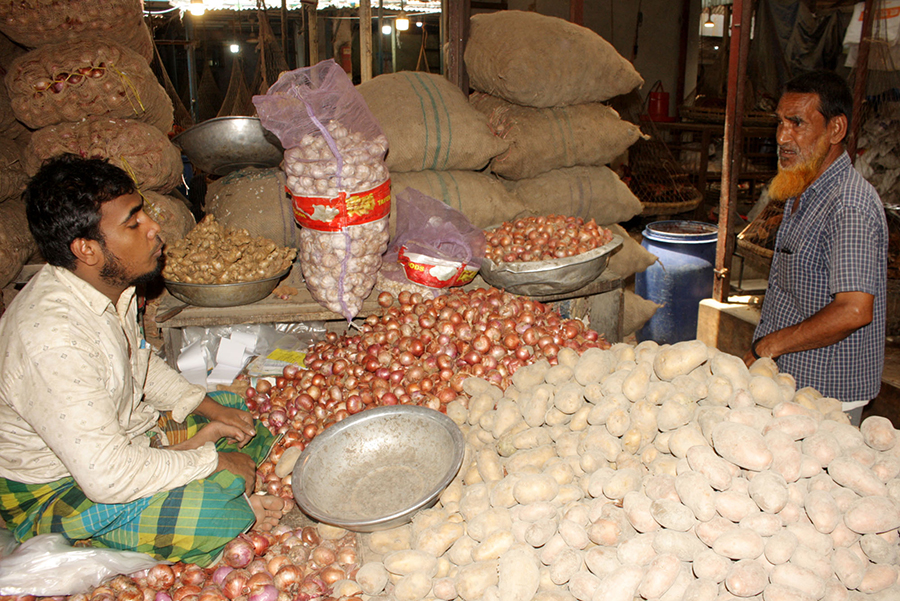
Published :
Updated :

The operators of the essentials market do not seem to have responded to the commerce minister's directive in the expected way. For the prices of three essential commodities, namely, potato, the local variety of onion and egg were fixed at the retail level through an executive order last week (on September 4) by the minister. And he also warned of the consequences if any trader dared to defy his directive. He further informed that officials of the Directorate of National Consumer Rights Protection (DNCRP), the district administration and the police would mount strict monitoring to see that the government's order was obeyed by the retail as well as wholesale traders. But to all appearances the traders did not care. Then are these traders more powerful than the government? How can a small grocer ignore a government order?
The grocer of a city ward or neighbourhood or the kitchen market buys his merchandise from the wholesaler at a certain rate. Now if he has to keep doing his business he has to make some profit after taking into account all the expenditures he has to make to run his business. These may include transport cost of the merchandise, rent for his shop, power bill and other costs. Now if the wholesaler from whom he gets his supply charges higher price than that fixed by the government for the three kitchen items in question, then what can the grocer do? He will have only two choices: either defy government order or close his business. That is what the regular shoppers observed a day after the government issued the order. On Friday, a day after the commerce ministry gave the order, potato, for instance, was selling at TK.45/50 per kg. That means the market price for potato was 25 to 39 per cent higher than what the government had fixed. The case for onion was not different as its price in the kitchen market was still 14 to 38.5 per cent higher than that set by the government.
But it does not mean that traders in the kitchen market are fair. In fact, they will not miss any opportunity to take advantage of lax government monitoring to raise the prices of their merchandise as the whim takes them. The wholesaler, too, will not act differently. The so-called syndicate will emerge as soon as the importers and wholesalers of the essentials think they can hoodwink the law-enforcers or can make them look the other way.
So there is no alternative to strong market monitoring by law enforcers, who should be upright to protect the market against any manipulation. However, it is one thing to monitor the market, and it is another to fix the prices of commodities. Because law alone cannot dictate prices unless there is adequate buffer stock of commodities to offset any foul play like hoarding or any other kind of activities by traders to create artificial crisis in the market. The bogey of importing certain items from the neighbouring country, too, is not an effective deterrent, since the dishonest section of traders know that there is a substantial time-gap between the decision to import and actually supplying those imported goods in the market. The best way is to use the buffer stock of the commodity in question to calm the volatile market. If past experience is any guide, government measures like fixing bus fares, taxi fares, commodity prices, to name but a few of such initiatives, never worked in this country.
In that case, to influence the essentials market, the government, too, will be required toplay by the rules of the market.
sfalimm.ds@gmail.com


 For all latest news, follow The Financial Express Google News channel.
For all latest news, follow The Financial Express Google News channel.